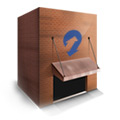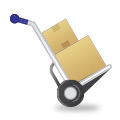FTZ9 Warehouse
The Hawaii Foreign-Trade Zone No. 9 (FTZ9) offers an on-demand warehousing service, open to the general public. The FTZ9 is especially suited for small-to medium-sized businesses looking to streamline their operations. The on-demand warehousing service allows you to receive foreign and domestic inventory into our facility, store merchandise at a reasonable rate, view stock levels, place orders and ship merchandise to your customers. There are no long-term contracts, no minimum volumes, and storage is charged on a per-cubic-foot basis so you only pay for the space you use. It’s easy and convenient, saving you time and money.
The FTZ9 bonded warehouse facility is approximately 500,000 cubic feet and located in the Port of Honolulu, directly adjacent to one of the State’s main container cargo terminals, the vibrant downtown business district, and the dynamic Kakaako community.
Businesses who can benefit
- Importers and exporters
- Companies who require multiple container staging
- Importers who need to relabel products (USDA, FDA, U.S. labeling)
- Businesses who need space for kitting products

Warehouse features
Customers of Hawaii’s Foreign-Trade Zone No. 9 enjoy a high-security facility, with a knowledgeable and highly professional staff to service you in all aspects of Foreign-Trade Zone operations. Our goal is to serve your needs effectively, efficiently, and economically.
- Over 500,000 cubic feet of warehousing space
- Merchandise warehoused until you ask for it
- Hourly labor services and equipment available at reasonable rates
- Storage costs based on the amount of space and services used
- Temperature-controlled storage rooms
- Online inventory management and tracking
- The majority of Hawaii’s customs brokers are located in our facility
- On-site shipping companies and freight forwarders
Labor & equipment rental

In an effort to provide a wide range of services, the Hawaii Foreign-Trade Zone No. 9 (FTZ9) allows for businesses to provide their own labor to load and unload merchandise from containers and rent forklifts by the hour.
An importer may also elect to hire the FTZ9 staff to provide a skilled forklift operators or laborers to assist with the merchandise loading and unloading process.
In any case, the FTZ9 will ensure that your merchandise will be handled by workers that meet both State and Customs and Border Protection guidelines for the safe handling of merchandise. All forklift operators and laborers will be checked for the appropriate operators certification and clearances to work in a bonded environment. Please call our Warehouse Operations at (808)586-2515 for more information.
How the Hawaii Foreign-Trade Zone can provide you savings
Duty Delay or Elimination
By using the Hawaii Foreign-Trade Zone, firms delay payment of duty (taxes) until they decide to enter the merchandise into U.S. Customs territory. Foreign merchandise transiting U.S. ports for foreign destinations avoids the payment of U.S. Customs duties and taxes through the use of Foreign-Trade Zones. Merchandise is inspected and sorted in Foreign-Trade Zones with only the saleable portion entering U.S. Customs Territory. Duty deferral or avoidance results in substantial cash savings.
Taking Advantage of the Tariff Schedule
The Tariff Schedule of the United States provides many opportunities for FTZ users. FTZ users look for differences in duty rates between components and final manufactured products. Products manufactured or assembled from foreign-sourced components within an FTZ may be subject to a lower duty rate than the sum of the parts from which they were made. This also applies to sets or kits.
Made in Hawaii
Products that are manufactured in FTZs may, if certain requirements are met, qualify for “Made in the USA” or “Made in Hawaii” labels even if the final product incorporates foreign components.
Avoiding Certain State Taxes
Goods which are in a Zone for a bona fide Customs reason are exempt from State and local ad valorem taxes.
Avoiding Bonded Warehouse Costs and Limitations
Importers who use FTZs post no bond and their merchandise may remain in the Zone indefinitely. In contrast, importers who store their merchandise in normal, bonded warehouses that are not part of a Foreign-Trade Zone must post a bond, and their goods may only be stored for a maximum of five years. Moreover, manufacturing, processing or altering goods in normal, bonded warehouses are limited. In Foreign-Trade Zones, similar restrictions do not apply.

It’s secure
Customs & Border Protection requirements within FTZs and federal criminal sanctions are deterrents against theft. The Hawaii Foreign-Trade Zone has never had an incident of lost goods which may result in lower insurance costs for you.
Warehouse Forms
Release Authorization / Pick up Slip – How you notify the FTZ9 that you would like to pick up items that are warehoused in our Pier 2 facility. your order will be ready for you within four hours if not sooner.
Employees and Authorized Signature – Give you total control of who is allowed to pick up and order goods for you.
U.S. Customs Form 214 (CF214) – Application for Foreign-Trade Zone Admission and/or Status Designation. This form is used to admit merchandise into the FTZ and must be completed by the importer/broker then submitted to the FTZ for zone lot number assignment. Once a zone lot number has been assigned, US Customs must approve the admission and/or status designation action based on the CF214. The CF214 shall also serve as a “Permit to Transfer,” which is required for the transfer of bonded merchandise into the FTZ.
U.S. Customs Form 216 (CF216) – Application for Foreign-Trade Zone Activity Permit. This form is necessary when an importer/broker has bonded goods stored in a Foreign-Trade Zone to be manipulated, manufactured, exhibited, or destroyed. The activity requested on the CF216 must by approved by US Customs before any action can be taken.
Warehouse Contact – By keeping us up to date with your contact information, this form allows us to keep you updated with any changes or notifications here at the FTZ9. The FTZ9 is moving towards a more paperless operations


